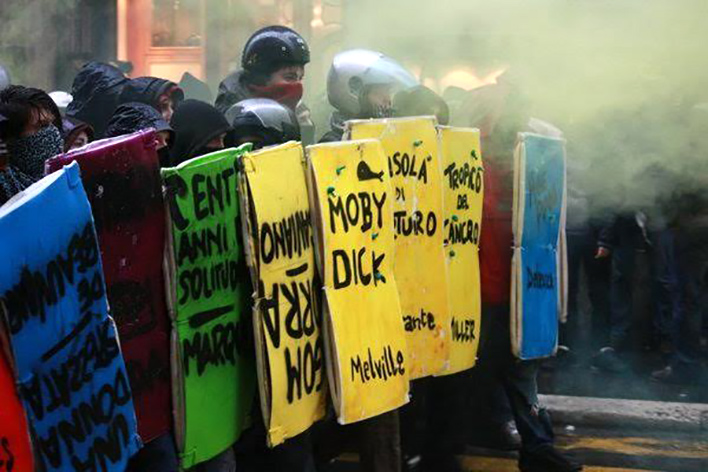L’impegno al tempo della globalizzazione, fra discorso ed egemonia: due prospettive rivisitate attraverso Foucault e Gramsci
Abstract
Il contributo affronta la complessa relazione fra discorso ed egemonia, evidenziando alcune della analogie e differenze fa due termini imprescindibili nella prassi critica contemporanea. Il discorso in Foucault rappresenta un tentativo di sopravanzare le principali forme di indagine sociale e testuale disponibili negli anni Sessanta: lo strutturalismo e l’ermeneutica; il discorso, partendo dall’analisi linguistica, abbraccia varie forme di socialità, dalla considerazione attribuita alla conoscenza, fino alla coscienza di sé a livello individuale e in un particolare gruppo. In questo schema, le istituzioni si basano evidentemente su pratiche discorsive e sulla loro circolazione. Gramsci, così come Foucault, riconosce lo stretto nesso esistente fra conoscenza e potere, ma l’egemonia, a differenza del discorso, individua, all’interno di una relazione fra due entità sociali, le modalità attraverso le quali una prevale, affermandosi attraverso una negoziazione del potere stesso. Il consenso che sostiene le forme più efficaci di egemonia, presuppone comune, nel quadro dei condizionamenti storico ambientali, una certa libertà d’azione dell’individuo e dunque, a differenza del discorso, non esclude la possibilità di un agente storico e di una prassi di resistenza nei confronti del nucleo egemone.Downloads
Riferimenti bibliografici
Arrighi, Giovanni, Capitalismo e disordine mondiale, Roma, Manifestolibri, 2010.
Apter, Emily, “Comparative Exile. Competing Margins in the History of Comparative Literature”, in Bernheimer 1995: 86-96.
Bernheimer, Charles (ed.), Comparative Literature in the Age of Multiculturalism, Baltimore, Johns Hopkins University Press, 1995.
Bhabha, Homi, The Location of Culture, London, Routledge, 1994.
Blanchot, Maurice, L’infinito intrattenimento. Scritti sull’insensato gioco di scrivere’, Torino, Einaudi, 1977.
Cospito, Giuseppe, “Egemonia”, in Frosini e Liguori 2004: 77-92.
Derrida, Jacques, La scrittura e la differenza, Torino, Einaudi, 1990.
Dreyfus, H.L. – Rabinow, P., La ricerca di Michel Foucault. Analitica della verità e storia del presente, Firenze, Ponte alle Grazie, 1989.
Ferris, David, “Indiscipline”, in Saussy 2006: 78-99.
Frosini, Fabio – Liguori, Guido (eds.), Le parole di Gramsci. Per un lessico dei Quaderni del carcere, Roma, Carocci, 2004.
Gramsci, Antonio, Quaderni del carcere, Torino, Einaudi, 1975.
Hall, Stuart, “Codificazione, decodificazione”, Politiche del quotidiano, Ed. Stuart Hall, Milano, Il Saggiatore, 2006.
Foucault, Michel, Dits et écrits, Paris, Gallimard 2001 (2 vols).
Foucault, Michel, Scritti letterari, Torino, Einaudi, 2004.
Foucault, Michel, Le parole e le cose. Un’archeologia delle scienze umane, Milano, RCS, 1996.
Foucault, Michel, L’archeologia del sapere. Una metodologia per la storia della cultura, Milano RCS, 1999 [1969].
Couzens Hoy, D., (ed.),
Foucault: A Critical Reader
, New York, Basil Blackwell, 1986.
Kadir, Djelal, “Comparative Literature in an Age of Terrorism”, in Saussy 2006: 68-77.
Lacan, Jacques, Il seminario, Libro III, Le psicosi 1955-1956, Torino, Einaudi, 2010.
Lavagetto,
Mario,
Freud, la letteratura e altro
, Torino, Einaudi, 1985.
Matte Blanco, Ignacio, L’inconscio come insiemi infiniti, Saggio sulla bi-logica, Torino, Einaudi, 1981.
Perniola, Mario, Contro la comunicazione, Torino, Einaudi, 2004.
Rorty, Richard, “Looking Back at Literary Theory”, in Saussy 2006: 63-67.
Said, Edward, Orientalism, London, Penguin, 2003 [1978].
Said, Edward, The World, the Text and the Critic, Cambridge MA, Harvard U.P, 1983.
Said, Edward, Nel segno dell’esilio. Riflessioni, letture e altri saggi, Milano, Feltrinelli, 2008.
Saussy, Haun (ed.), Comparative Literature in an Age of Globalization, Baltimore, The Johns Hopkins University Press, 2006.
Saussy, Haun, “Exquisite Cadavers Stitched from Fresh Nightmares”, in Hall 2006: 3-42.
Spivak, Gayatri Chakravorty, Morte di una disciplina, Roma, Meltemi 2003.
Informazioni sul copyright
Questa licenza permette a terzi di riprodurre, distribuire, comunicare al pubblico, esporre in pubblico, rappresentare, eseguire, recitare e modificare quest'opera, purché vengano citati l'autore e la rivista. Questa è la più ampia tra le licenze Creative Commons, rispetto alle libertà concesse a terzi sulle opere licenziate sotto Attribuzione.









